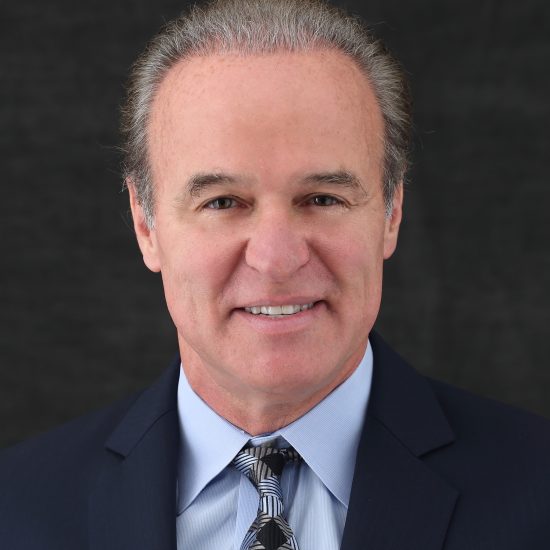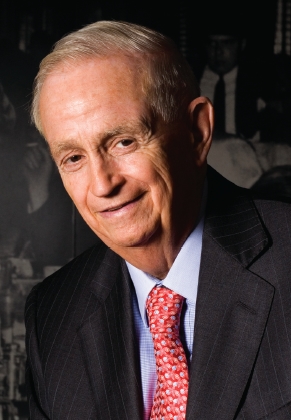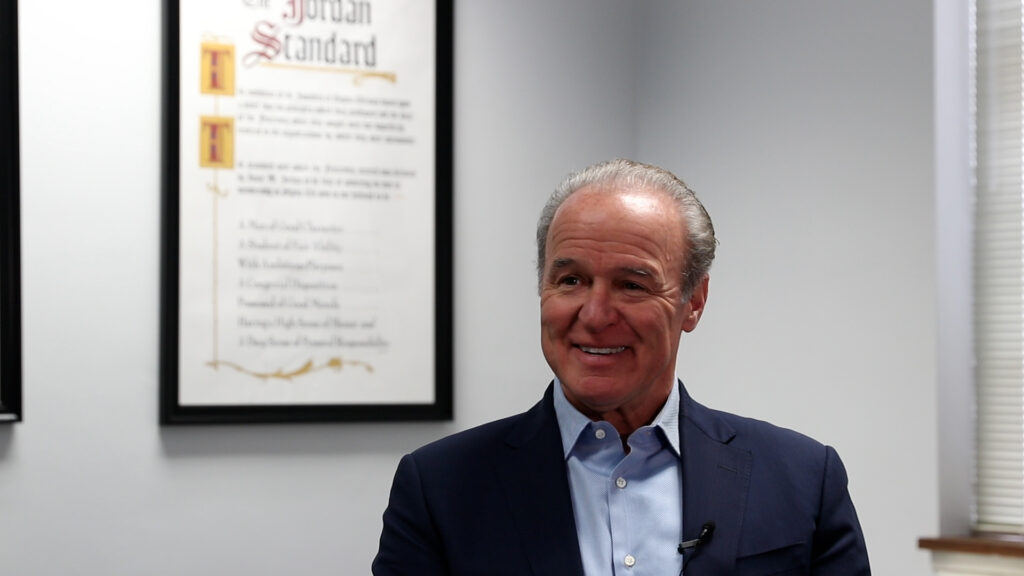Fraternity
- 1714 Hinman Ave. Evanston, IL 60201
- headquarters@sigmachi.org
- Directory

BY ASHLEY SZATALA
Luce discusses the leadership skills he developed while learning from and working with Significant Sig Bill Marriott, UTAH 1954, and those servant leader skills were honed from the Sigma Chi chapter all the way through multiple roles and industries

Transformational leadership is the practice by which leaders inspire and empower others to innovate and create change that will positively impact the Fraternity and ultimately the world. The transformational leader first must learn to manage self before being able to lead others and cultivate action within their community and campus.
Soft skills are invaluable components to a transformational leader, according to Significant Sig Jim Luce, NEVADA-LAS VEGAS 1980. Effective collaboration, communication and teamwork are all skills Luce highlights as having served him well from his Sigma Chi chapter all the way through various careers and industries. Many of the leadership skills he possesses today are ones he honed while working in the hospitality industry and learning from Significant Sig Bill Marriott, UTAH 1954.
Luce spent more than two decades with Marriott Hotels and Resorts as a regional vice president – sales and marketing before becoming executive vice president – retail sales and strategic accounts for Bergen Brunswig Drug Company. He then joined Amneal Pharmaceuticals in its earliest days as executive vice president – sales and marketing and retired from there after 12 years, growing revenue from almost zero to $1.1 billion. Luce now serves as chairman of the Sigma Chi Foundation’s Marcom and Development Committee and used his passion for wine to create The Legacy Cellar Foundation, enabling wine collections to be converted into charitable donations, which he co-founded and is chairman.
Luce discusses below his approach to leadership, the impact Sigma Chi has made on his life and how others can affect change around them.
You started your career at Marriott and worked with Significant Sigs Bill Marriott, UTAH 1954; Montage CEO and Founder Alan Fuerstman, GETTYSBURG 1978; and Marriott CEO Tony Capuano, CORNELL 1987. How did that experience at Marriott prepare you for furthering your career?
With a hotel management degree completed, I started my career with Marriott right out of college. I was very blessed to be starting at Marriott’s Camelback Inn Resort and Spa in Scottsdale, Arizona, which was one of only 13 five-star resorts [at the time] in the United States.
J.W. Marriott, Sr., then chairman of the board, and his wife would vacation there about five months per year, so I got a chance to get to know him. I worked for Marriott for 21 years, with progressive roles, so I was fortunate to get to interact directly with Bill Marriott a good amount of time, and then, as director of sales, we opened Marriott’s Desert Springs Resort in Palm Desert, California. I opened it with Alan Fuerstman. He was the resident manager, and as we worked closely, we became fast friends. He eventually moved on to the Phoenician Resort and led that to become a five-star resort, then opened the Bellagio as the managing director, eventually creating his own ultra-luxury hotel company, Montage International, and, 20 years later, is still its founder, CEO and chairman.
Tony Capuano, who’s currently the CEO of Marriott, started his time with Marriott back in the mid-’90s to lead select service development in the West Region while I was a regional vice president in that same region. We worked closely and he has become a good friend, especially once we both realized we are Sigs.

I don’t think there is a better company in the world than Marriott, as far as how they treat their associates, how they train you, how they spend time teaching you the proper way to lead and to manage, which are two very different skills that people tend to blend together. Also, Marriott is a big proponent of continuous improvement, regularly bringing in outside experts to enhance their leaders’ knowledge and broaden perspectives. If you can get a nugget each time, you become better managers and leaders over time. It was a phenomenal foundation for the balance of my career.
If Marriott was headquartered in California, I probably never would have left. But, I couldn’t move up any further without moving to the Washington, D.C. area, which is the location of Marriott’s headquarters. Nobody ever thought I’d leave Marriott. I can’t emphasize enough how much I looked up to Bill Marriott from my college days of, ‘Wow, he’s a Sigma Chi and he runs the best company in the industry I am going to pursue,’ and then experiencing Marriott firsthand and meeting several Sigma Chis along the way.
In my two industries after Marriott, numerous people would ask, ‘How did you learn that? Where did you get that started?’ like the way I did time management. I’ve taught so many people, and it was a class that Marriott put me through about two months out of college. And I’ve used it almost every day for my entire career. Bill brought in all kinds of great speakers to get you thinking, challenge you and help you find ways to constantly improve. So that’s how I’d say the foundation started.
What is a leadership lesson you learned early in your career that has stuck with you?
Bill Marriott would be out in hotels constantly. When he came to walk your hotel, he wanted to meet all the employees. That was his first priority. And then if he’s walking through the hotel and there happens to be a piece of paper on the ground, he’d stop and pick it up. He had no ego about running the business. It was everybody’s role to make the business successful.
I think probably my strongest takeaway from Marriott is that I developed my leadership style [from him] and taking what was so successful, then adjusting it to who I was. I developed a style that was very much based in the Marriott philosophy, which is very collaborative.
In meetings I’d lead, I would ask everyone their opinion about whatever issue we were discussing. We didn’t operate by consensus, though. The challenge of leading by consensus is that you don’t typically get decisions made unless it’s an obvious thing that everybody agrees to. So, I wasn’t a consensus leader, but I was collaborative yet not afraid to make decisions and provide feedback of why the decision was made.
We’d go around the room and talk about it. I would say, ‘OK, I’ve heard it all, and here’s the way we’re going to go.’ A lot of leaders, however, mistakenly stop at that point. And what I always did is [state and explain that], ‘I heard about options A and C. Here’s why I think B is better than A and B is better than C.’ They may not all agree with my logic or how we got to the decision, yet everybody knows they were heard and their options considered, while I made the best decision possible with all the feedback available.
"I had logic and reason, and he may or may not have agreed with the logic or reason, but you can say anything to anybody if you say it with respect and you put meaningful thought into it."
~SIGNIFICANT SIG JIM Luce, NEVADA-LAS VEGAS 1980
If it’s a good idea, it’s a good idea. I didn’t care if it was the housekeeper that had an idea out of the blue or Bill Marriott or anyone in between. I even told Bill Marriott one time that I did not agree with a significant strategy he was going to launch. I was a regional vice president at the time and my 11 peers said, ‘You can’t disagree with Bill Marriott.’ I said, ‘That’s what he pays us to do — to understand our marketplace, know what’s going on and share how we feel any initiative would impact our markets.’
But I never said, ‘I don’t agree.’ I’d say, ‘That doesn’t work for my region. Here’s why I feel that’s not the best solution.’ I had logic and reason, and he may or may not have agreed with the logic or reason, but you can say anything to anybody if you say it with respect and you put meaningful thought into it.
‘Here are the things that you may not see, Mr. Marriott, because you’ve got [at the time] 2,000 hotels to lead. I’ve got 200 hotels in my region, and here’s how that would play out in my region from what I know about my markets.’ So, I disagreed, and we went to a coffee break. Bill Marriott talked to our head of sales and marketing and came back and said, ‘Jim made a good point. We’re not going to go that way. We’re going to change it up because of this and that.’
All the while, everyone told me you can’t disagree. Bill Marriott never got upset about that. He encouraged feedback and input, from anyone and everyone.
WHO DO YOU LOOK UP TO FOR INSPIRATION OR MENTORSHIP?
I would say Bill Marriott. I have other people that inspire me for different reasons now, but throughout my career, Bill has been just such an incredible leader and an incredible person. He always walked the talk, had a great mind for business and was not afraid to take smart risks.
For example, [beginning in 1972] we had a cruise ship company with three cruise ships [after Marriott partnered with Sun Line]. We eventually got out of that [Sun Line repurchased the ships from Marriott around 1985 to 1987]. Bill went into it with the thought that [the ships] are just hotels on water — as his vision was wherever you sleep and eat, we should be able to be in that business segment.
Cruise ships, however, have such a different dynamic in how they get reserved, the costs, the risks, etcetera. That business just couldn’t grow at the pace the rest of the company did and is very capital intensive. So, he wasn’t afraid to say, ‘You know what? I made a mistake.’
In another example, [in 1987] we got into assisted living. We bought an assisted living company because remember, it’s rooms and beds and food, but at the same time it has this healthcare piece and regulatory responsibility, which is not something we were very good at executing and limited our growth potential.
Well, the company got frustrated trying to manage those costs because insurance companies control a lot of that, and it just was a business that, again, we couldn’t grow profitably in pace with the risk or the opportunity in the hotel business. And again, it’s capital intensive. So, he wasn’t afraid to get out of that [in 2002].
He is a great visionary. Here’s one more example. A lot of people don’t realize that Marriott owns Ritz-Carlton. What happened is Bill Marriott wanted to compete in the super luxury hotels like Four Seasons, Ritz-Carlton, Peninsula Hotels, etcetera. So, we created the JW Marriott Century City in Los Angeles. It was all very high-end, above our best Marriott hotel experiences. We put in amenities way beyond any Marriott service.
We opened the hotel. It was phenomenal. Great hotel independent evaluations. However, when we went to work on getting customers from Ritz-Carlton to the JW Marriott, what we found is 50% of those were business travelers that want the upscale hotel, such as board members and executives. They were very excited to stay because they could get Marriott Points and get a high-end experience. The other half of their customers were the “ego” customers. During our focus groups to evaluate the potential, one woman said, ‘I would never lower myself to stay in a Marriott hotel. I don’t care how nice. I only stay in Ritz-Carltons, Four Seasons and the like.’
So, what Bill Marriott did is went and bought the Ritz-Carlton Hotel Company from W. B. Johnson, who was ready to get out of the business. [Marriott purchased a 49% stake in the company in 1995 and purchased an additional 50% stake in 1998.] With the purchase, however, we didn’t tell anyone we bought it. We didn’t market it because we didn’t want to “downgrade” the Ritz-Carlton brand by saying it’s a Marriott. Eventually, in about year six or seven of owning Ritz-Carlton, [Marriott] announced “a marketing agreement” with Ritz-Carlton where you could cash in your Marriott reward points [now called Marriott Bonvoy] to stay at Ritz-Carltons.
So anyway, you learn not to be afraid to say, ‘Hmm, you know, it didn’t work.’ I’ve done that many times in my career. I’ll say, ‘Hey, let’s try this, but understand we’re going to have a short leash. If it doesn’t work and we can’t figure out why it’s not working, we’re not going be afraid to pull the plug and just shut it down.’ So, that [lesson] is part of why Marriott is such a good company.
You joined the Sigma Chi Foundation Board of Governors in 2021. What impact has Sigma Chi made on your life, and why do you feel it’s important to give back to Sigma Chi through volunteer service?
My brother is a Sigma Chi, and my son is a Sigma Chi. I went into college at Bucknell, rushed and then pledged Sigma Chi, but didn’t get initiated. I transferred mid-year to University of Nevada, Las Vegas. Even though I never got initiated at Bucknell, but there was a Sigma Chi chapter at UNLV that was a great fit for me.
It was clearly a different group of guys at both campuses. It became an instant place to belong. It gave me a strong foundation for collaboration and conflict management. I think it was an invaluable experience having brothers around you for support but also for calling BS on you and helping you figure out who you are along the way.
Throughout my career, networking’s been one of my strengths as well as building relationships. When I initially meet someone, I always ask the questions, male or female, ‘Where are you from? Where did you go to school? Were you in a fraternity or sorority?’ Getting those answers instantly gives you something to talk about with that person before you even talk about hobbies and families and whatever to build a personal relationship.

It’s amazing how many guys you find that, ‘Oh, I’m a Sigma Chi.’ It immediately jumps you forward in building a relationship with that person. Many of my best friends I met through Sigma Chi that I did not go to school with.
Early on, right out of college, I was on the Leadership Training Workshop faculty for six years, and I was chapter advisor at Arizona State as well as president of the alumni chapter in Phoenix. I also have been involved in alumni chapters here in California. I’m just very, very proud of what Sigma Chi stands for, who we are, and the brothers I’ve met and become such good friends with along the way.
As far as why [I joined] the Foundation board, [68th Grand Consul] Mike Greenberg, ILLINOIS WESLEYAN 1982, and I actually started on workshop faculty the same year. So, I’ve known Mike for 40 years. When I retired five years ago, I called him up and said, ‘I want to put some more time into Sigma Chi. Should I get involved with SCLI [Sigma Chi Leadership Institute], the Fraternity, the Foundation or …?’ He said, ‘We absolutely need somebody like you on the Foundation Board. We don’t have anyone that has marketing and sales background.’ I also discussed it with Significant Sig and Foundation Governor John Pasquantino, a fellow UNLV [1984] classmate, with the same, enthusiastic response.
Probably two reasons that the Foundation was the right fit for why I wanted to get back involved. First, Greek[-letter] systems are at risk across the country. I want to make sure my grandkids and their grandkids and their grandkids have the opportunity to join a fraternity or sorority if they want. Everything we can do with Sigma Chi to help prevent the demise of Greek[-letter] systems is very important to me.
Secondly, and a very close second, is the transformational impact of SCLI. I was blown away when I first read about it and learned about it. Then, we get the accreditation and the way it can make men better coming out of college, and during college, is truly life changing. I think SCLI is going to turn the Greek[-letter] world on its ear when it’s all fully rolled out to all of our chapters. So, whatever we can do from the Foundation to fund where the Fraternity is headed is what got me hooked and committed to passionately serving on the board.
You’ve been financially supporting nonprofits through the Legacy Cellar Foundation. What was your motivation for establishing it, and how is it meeting fundraising needs?
One of my passions is wine, and I started it with a friend that runs a company called Anonymous Philanthropy. When I retired, we got talking about wine. He asked, ‘Do you want to do something with wine? I have this idea that kind of came into my head when I attended a cocktail party and met [famed wine critic] Robert Parker.’ Robert Parker founded The Wine Advocate and back in the ’70s, creating the first and premier wine-rating system. He is a big, big name in the wine space, and if he gave you a 100-point rating, your wine was virtually guaranteed to sell like crazy.
So anyway, my friend said he met Robert Parker three months earlier. [Parker] said, ‘I have thousands and thousands of bottles of wine. I have one daughter, and she doesn’t drink wine. I obviously can’t go through all this. I’d love to find a way to liquidate this over time for the benefit of charity.’ That was about the whole conversation. Fast forward three months later, my friend and I are sitting down and talking, and he asked, ‘What do you think about this idea? Let’s find a way to help people liquidate their wine cellars with 100% of the proceeds going to whatever charity or charities they want them to go to?’
"To be a transformational leader, you always have to say, ‘What could we do be doing better? What could we do differently?’ You can't be afraid to mess with it because it's working well. If you don't want to mess with it because it's working, then you're not going to have transformational outcomes. And I think a transformational leader leverages all the talents [the team has] to figure out how can we make us as a group significantly more effective than we were before."
~SIGNIFICANT SIG JIM Luce, NEVADA-LAS VEGAS 1980
We spent about a year with the accountants, lawyers and tax experts. When you liquidate wine, somebody has a cellar. The auction houses cherry-pick the best bottles that are going to draw the most money. The family may cherry-pick some, and then you have the rest left. What do you do with that, and how do you maximize money for it and turn it into assets?
So, we went to the auction houses and proposed, ‘If we bring a cellar to you, we want you to take half of the buyer’s fee for yourself and give us the other half, offsetting our administrative costs. They all agreed. Also, if someone has a wine cellar that has a lot of good wine, yet not phenomenal wine, that for whatever reason doesn’t go in the auction nor via online sales, then we’ll donate those bottles to a charity for, by example, their gala event. If we give 200 bottles to the local charity and they do not have to spend that money paying the hotel for the wine, that’s equal net value as giving them a donation. And rather than committing your entire cellar in your estate, you can allocate a certain percentage or number of your bottles to liquidate each year.
WHAT DOES TRANSFORMATIONAL LEADERSHIP AND PUTTING IT INTO PRACTICE MEAN TO YOU?
Transformational leadership, if you break it down, is not just leadership. It is significantly changing the shape, momentum and impact of something through visionary leadership while empowering and motivating those you are leading. To me, leadership is not just keeping things going — that’s management. Leadership is taking it to the next place, level, angle, direction, whatever, to make it better than it was yesterday. And transformational means not a small incremental change but rather significant changes that transform the direction, magnitude and velocity of an organization.
You need strong, robust soft skills to do that. I feel that is how I’ve operated my entire career. And the interesting thing is, if you take all the points we have talked about, it worked phenomenally well in three different industries and companies, both public and private, Fortune 20 and startup. This is clear proof that transformational leadership is highly effective in any organization of any size.
To be a transformational leader, you always have to say, ‘What could we do be doing better? What could we do differently?’ You can’t be afraid to mess with it because it’s working well. If you don’t want to mess with it because it’s working, then you’re not going to have transformational outcomes. And I think a transformational leader leverages all the talents [the team has] to figure out how can we make us as a group significantly more effective than we were before.
You set the vision and get everybody aligned on the vision. Let everybody understand what their role is in getting to the vision and that they are a critical part of it. There’s so much about teamwork and collaboration that has to do with phenomenal and transformational leadership.
Also, it’s really important as a transformational leader to ask questions and listen. Going back to earlier where I would ask my group, ‘What do you think?’ You don’t ever do that as lip service. To really understand, you’ve got to ask questions and keep driving layers down [to the issue or topic at hand]. Then you get to really understand it because sometimes not everybody explains their ideas well. You’ve got to do that if you really want to build strong teamwork so everyone understands where you’re headed and where you’re taking them instead of just managing things along the way. So, that’s how I would describe transformational leadership.
Key Takeaways for Leadership Development:
Transformational leadership is the practice by which leaders inspire and empower others to innovate and create change that will positively impact the Fraternity and ultimately the world. The transformational leader first must learn to manage self before being able to lead others and cultivate action within their community and campus. This quarterly series highlights members who are putting transformational leadership into practice. For more information about Sigma Chi’s Transformational Leader program, visit sigmachi.org/transformational-leader.